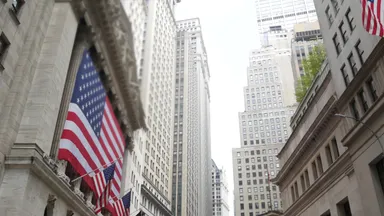The US 500 index
The US 500 is a tradeable market from Capital.com, enabling you to take a position on the price of the US 500 stock index using CFDs.
The US 500 is an American stock market index. It tracks the performance of the top 500 companies listed on stock exchanges in the United States – like the Nasdaq Stock Market or the New York Stock Exchange (NYSE). It is weighted by market capitalisation, which means that the constituents with a higher market cap carry a higher weighting percentage in the index and, therefore, have more influence over its performance.
You can practise trading the US 500 and other indices on a risk-free demo account.
The US 500 is one of the most commonly followed equity indices. It is often perceived as the best representation of the health of the US stock market, and is considered a bellwether for the overall US economy. Its weighting methodology and diverse constituency set it apart from other major American indices like the US Tech 100 or the US Wall Street 30.
The US 500’s constituent stocks are primarily chosen by capitalisation. However, other factors like liquidity, public float, sector classification, financial viability and trading history are also considered. The index is reviewed and rebalanced on a quarterly basis.
While there are 500 companies included in the list, the US 500 index is composed of 505 common stocks. This difference in numbers occurs as a few index’s component firms issue more than one class of stock. For example, Alphabet Class A shares (GOOGL) and Alphabet Class C shares (GOOG) are both included in the US 500.
Some of the largest companies included in the US 500 index at the time of writing – which are of course subject to change – are Apple (AAPL), Microsoft (MSFT), Amazon (AMZN), Meta (FB), Berkshire Hathaway (BRK.B), Visa (V), JPMorgan Chase (JPM), Johnson & Johnson (JNJ), Walmart (WMT), AT&T (T) and ExxonMobil (XOM).
Trade US 500 (US500) CFDs
US 500 (ticker: US500) is an index that reflects the performance of a selected group of shares, usually tied to a specific market, region or sector. On Capital.com, it’s available to trade as a contract for difference (CFD), allowing you to speculate on price movements without owning any of the underlying shares. This means you can trade in either direction – rising or falling – depending on your view.*
*CFDs are traded on margin, leverage amplifies both profits and losses.
US 500 price today
The index is quoted in $ and is currently trading around 6835.1.
Live price overview
Here’s an overview of the current US 500 price and its recent trading ranges.
- Daily range: 6833 – 6893.1
- Daily movement: -33.3 (-0.4846)
- Weekly range: 6710.5 – 6958.9
- Monthly range: 6710.5 – 6991.6
- Yearly range: 4807.9 – 7013.7
Why trade index CFDs on the price of US 500 with Capital.com?
Capital.com provides a technology-driven trading experience that supports informed decision-making.
Advanced charting and analysis
Use interactive tools to study the US 500 price chart in detail.
- Access 100 technical indicators
- Choose from 12 chart types
- Analyse fast, intuitive charts powered by industry-leading tools
Wide market offering
Join over 827,000 global traders and explore more than:
- 4,000 stock CFDs
- 60 commodity CFDs
- 30 index CFDs
- 120 forex pairs
- 450 crypto CFDs
User-rated platforms
- TradingView rating: 4.8
- App Store rating: 4.7
- Google Play rating: 4.6
- Trustpilot score: 4.6
What influences the price of US 500?
The US 500 (US500) price may be influenced by various market factors, including:
- Performance of the companies within the index
- Macroeconomic indicators such as GDP, inflation, and employment data
- Central bank policy decisions
- Broader market sentiment and risk appetite
- Geopolitical events or global news
US 500 forecasts
US 500 forecasts commonly focus on news, sector updates, and broader market conditions rather than fixed price targets. Traders can combine technical analysis with fundamental insights to form expectations about future price movement.
Instead of relying on a single prediction, many traders monitor ongoing analysis and real-time data to adapt to changing market conditions.*
*Analyst forecasts are often inaccurate and past performance isn’t a reliable indicator of future results.
How to trade US 500 index CFDs
Trading index CFDs allows you to speculate on price direction without owning the underlying shares:
- Go long (buy) if you think the index may rise
- Go short (sell) if you think it may fall
As CFDs use leverage, both gains and losses are magnified.
Risks of trading index CFDs
CFD trading carries a high level of risk. Key risks include:
- Market volatility
- Leverage amplifying losses as well as profits
- Potential funding costs for overnight positions
- No ownership of any underlying assets
Latest indices articles



